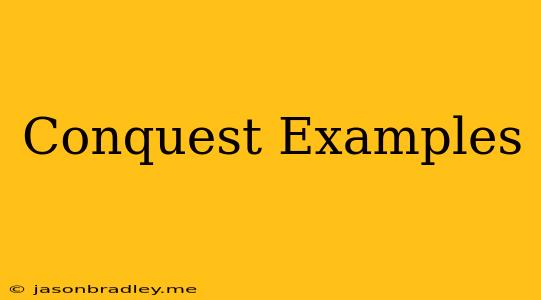Conquest: A Look at Historical Examples
Conquest, the act of taking control of a territory or people by force, is a recurring theme throughout human history. It's a complex phenomenon with far-reaching consequences, shaping societies, cultures, and political landscapes.
Here are some prominent examples of conquest from various eras and civilizations:
Ancient Empires
- The Roman Empire: Rome's rise to power was fueled by a series of military conquests. Starting from a small city-state, Rome expanded its dominion across the Mediterranean, subjugating numerous civilizations and cultures. The Roman legions were famed for their discipline and tactics, ultimately controlling a vast empire encompassing much of Europe, North Africa, and the Middle East.
- The Persian Empire: The Achaemenid Persian Empire, under figures like Cyrus the Great, conquered vast swathes of land spanning from Greece to India. Their empire was known for its efficient administration, tolerance of diverse cultures, and the development of a vast network of roads and communication.
- The Mongol Empire: Under Genghis Khan and his successors, the Mongols embarked on one of the largest conquests in history, spanning from Eastern Europe to the Pacific Ocean. They were renowned for their equestrian skills, military tactics, and ruthless efficiency, creating a vast and interconnected empire.
The Age of Exploration
- The Spanish Conquest of the Americas: This era witnessed the conquest of the Aztec and Inca empires by the Spanish. The Spanish conquistadors, aided by superior weaponry and alliances with indigenous groups, brought down these powerful empires, leaving a lasting impact on the history and cultures of the Americas.
- The British Empire: Through a combination of military conquest, diplomacy, and trade, the British Empire expanded its influence across the globe. It established colonies in North America, India, Australia, and other parts of the world, leaving a legacy of complex political, social, and economic relations.
Modern Conquests
- The German Invasion of Poland: The 1939 invasion of Poland by Nazi Germany marked the beginning of World War II. This act of aggression, violating international treaties, demonstrated the destructive potential of conquest in the modern era.
- The Soviet Invasion of Afghanistan: The 1979 Soviet invasion of Afghanistan was a protracted and bloody conflict that significantly impacted the Cold War. It demonstrates the ongoing challenges of conquest in the 20th century.
The Consequences of Conquest
Conquest has had profound and often enduring consequences for the conquered people and the conquering power. Here are some key effects:
- Cultural Exchange: Conquest often leads to cultural exchange, with the conquering civilization influencing the conquered people and vice versa.
- Exploitation and Oppression: Conquest frequently results in the exploitation of the conquered people's resources and labor, and their oppression under the rule of the conquerors.
- Political Change: Conquest can reshape the political landscape, leading to the creation of new empires, the collapse of existing states, and the establishment of new systems of government.
- Economic Transformation: Conquest can profoundly impact the economic structures of both the conquering and conquered societies, leading to changes in trade, resource allocation, and economic power.
A Legacy of Conflict
Conquest is a complex and multifaceted phenomenon with far-reaching consequences. While it has played a crucial role in shaping history, it has also been a source of immense suffering and upheaval. Understanding conquest's complexities and legacies remains vital for comprehending the past and shaping a more peaceful future.
